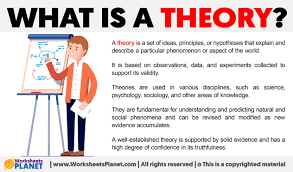The Importance of Theory in Understanding the World
Theory is a fundamental aspect of human knowledge and understanding. It provides a framework through which we can interpret and make sense of the world around us. Whether in the fields of science, philosophy, or social sciences, theory plays a crucial role in shaping our perceptions and guiding our actions.
What is Theory?
At its core, theory is a set of principles or ideas that seek to explain a particular phenomenon or set of phenomena. It is not merely conjecture or guesswork but is based on systematic observation, analysis, and interpretation. Theories help us organise information, predict outcomes, and test hypotheses.
The Role of Theory in Different Disciplines
In science, theories such as evolution, relativity, and quantum mechanics provide frameworks for understanding the natural world. These theories have stood the test of time through rigorous testing and validation.
In philosophy, theories about ethics, metaphysics, and epistemology shape our understanding of morality, reality, and knowledge itself. Philosophical theories invite us to question assumptions and delve into deeper layers of thought.
In social sciences like sociology, psychology, and economics, theories help us comprehend human behaviour, societal structures, and economic systems. They offer insights into why people act the way they do within various contexts.
The Evolution of Theory
Theories are not static entities but evolve over time as new evidence emerges or paradigms shift. Scientific revolutions like those proposed by Thomas Kuhn highlight how existing theories can be replaced by more comprehensive explanations.
Challenges in Developing Theories
Developing robust theories requires critical thinking skills, creativity, and openness to new ideas. Researchers must navigate uncertainties and complexities to construct models that accurately represent reality while acknowledging their limitations.
Conclusion
In conclusion, theory serves as a cornerstone of human knowledge by providing frameworks for understanding complex phenomena. By engaging with theory across different disciplines, we can deepen our insights into the world we inhabit and foster intellectual growth.
Six Essential Tips for Mastering Theoretical Concepts
- 1. Understand the basic principles before diving into complex theories.
- 2. Take notes and summarise key concepts to aid in understanding and retention.
- 3. Discuss theories with peers or instructors to gain different perspectives.
- 4. Apply theories to real-life examples to enhance comprehension.
- 5. Stay updated with current research and developments in the field of study.
- 6. Practice critical thinking by questioning assumptions and exploring alternative explanations.
1. Understand the basic principles before diving into complex theories.
To effectively navigate the realm of theory, it is essential to grasp the foundational principles before delving into intricate concepts. By establishing a solid understanding of the fundamental aspects of a theory, individuals can build a strong framework upon which to explore more complex ideas. This approach not only ensures clarity and coherence in comprehension but also facilitates a smoother transition towards grappling with the nuances and intricacies that advanced theories may present. In essence, mastering the basics serves as a crucial stepping stone towards embracing the depth and breadth of theoretical knowledge.
2. Take notes and summarise key concepts to aid in understanding and retention.
Taking notes and summarising key concepts is a valuable tip when delving into theory. By actively engaging with the material through note-taking, we reinforce our understanding of complex concepts and enhance our ability to retain important information. Summarising key ideas helps distil the essence of the theory, making it easier to grasp overarching themes and connections within the subject matter. This practice not only aids in comprehension but also serves as a reference point for revisiting and reinforcing our knowledge over time.
3. Discuss theories with peers or instructors to gain different perspectives.
Engaging in discussions about theories with peers or instructors can offer valuable insights and diverse perspectives. By sharing and exchanging ideas, individuals can deepen their understanding of theoretical concepts and explore various viewpoints. These conversations not only enhance critical thinking skills but also foster a collaborative learning environment where different interpretations can be considered and debated. Embracing this tip can lead to a richer appreciation of theories and encourage intellectual growth through meaningful dialogue.
4. Apply theories to real-life examples to enhance comprehension.
To enhance comprehension, it is beneficial to apply theories to real-life examples. By connecting theoretical concepts to practical situations, individuals can gain a deeper understanding of how theories operate in the real world. This application allows for a more tangible and relatable grasp of complex ideas, fostering a more profound insight into the relevance and impact of theories on everyday experiences and phenomena.
5. Stay updated with current research and developments in the field of study.
To enhance your understanding and application of theory, it is essential to stay abreast of current research and advancements within your field of study. By keeping up-to-date with the latest findings and developments, you can enrich your knowledge base, gain fresh perspectives, and ensure that your theoretical framework remains relevant and informed. This proactive approach not only deepens your understanding of existing theories but also opens doors to new insights and potential areas for exploration within the ever-evolving landscape of academia and research.
6. Practice critical thinking by questioning assumptions and exploring alternative explanations.
To enhance your understanding of theory, it is essential to practice critical thinking by questioning assumptions and exploring alternative explanations. By challenging established beliefs and considering different viewpoints, you can develop a more nuanced perspective and uncover hidden insights. This approach not only strengthens your analytical skills but also fosters a deeper appreciation for the complexity of theories and their implications in various contexts.
